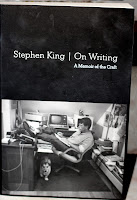 I saw this photograph on Facebook a week or two ago and I immediately snatched it for this post. I didn't even have to read the story to understand the meaning of the photo; it spoke volumes to me. It says to me, "My life isn't over, I'm in control. Bring it."
I saw this photograph on Facebook a week or two ago and I immediately snatched it for this post. I didn't even have to read the story to understand the meaning of the photo; it spoke volumes to me. It says to me, "My life isn't over, I'm in control. Bring it."However, when I read this story about one victim of the Boston Marathon bombing, I didn't want to leave it as just a "share" on Facebook. I wanted it to be an addition to my post about underestimating the American spirit, because that is exactly what the world has witnessed here.
This isn't the only photograph which has touched me in the past year. There have been a few. I don't know how old these photographs are, but they each reached me at a pivotal point in my writing journey, so I want them all here in my compilation of this article about progress and inspiration.
As most of my friends and family know, I come from a military background. My father was a retired Marine. My husband is a retired Marine. My son is an Army veteran who served in Iraq and who is now medically retired. So, it shouldn't be a surprise that this photo also inspires my post today.
Here I see this super sexy guy, and he's confident, determined, and very much still in the game. This is the American spirit I see and appreciate. It reminds me of what this country stands for. Not what it has become. There are still some who will never give in, who will always remain hopeful for our future, and who, despite their own setbacks, will continue to inspire and give hope to others.
 Sometime last year, a regular mammogram revealed an area of concern and my doctor scheduled a punch biopsy. I wasn't sure what to expect, but immediately I began thinking of my options, my husband having gone through a cancer diagnosis 2 years earlier.
Sometime last year, a regular mammogram revealed an area of concern and my doctor scheduled a punch biopsy. I wasn't sure what to expect, but immediately I began thinking of my options, my husband having gone through a cancer diagnosis 2 years earlier.That is why when I saw this photograph for the first time, I was filled with hope and I thought, "If I come out of this with a double mastectomy, I'm going to finally give in and get that tattoo I've always wanted of the fire dragon wrapped around a castle." I don't care if you think it's lame, Diane. Getting back to the nature of this post.
We are divided by many things. Politics gets us pitted against one another. So does religion, racial inequalities, gender inequality, and so many other divisive elements for which we refuse to enter into dialogue for whatever reason. Maybe it's a tool for those who benefit from the division. Remember when your kids did it? Divide and conquer.
We parents knew how to deal with it: the united front. Let us not turn our heads to the divisive, but see it for what it is and move along. Let us see the truly beautiful in people who still believe. There is hope. You just have to step toward the side of positive and let's create many instances of this type of media, rather than accepting the feed of those nuggets which divide and conquer, because what are we trying to conquer here anyway? Share and re-tweet positives!
The inclusion of these photos into my post today is my way of sharing what I believe is important in healing as a nation and reflecting as individuals. It's important that you know, regardless of your need to be right, your need to win, or your need to be on top of any situation, there are people who have won while our eyes have been shut.
Take a moment to reflect on what it means to truly win at life. What strengths in people have you witnessed in the past? Have they inspired you to look beyond the bleak and foreboding obstacles which threaten your happiness?
Visit my Alphabet Links:
A - B - C - D - E - F - G - H - I - J - K - L - M - N - O - P - Q - R - S - T - U - V - W - X - Y - Z





























